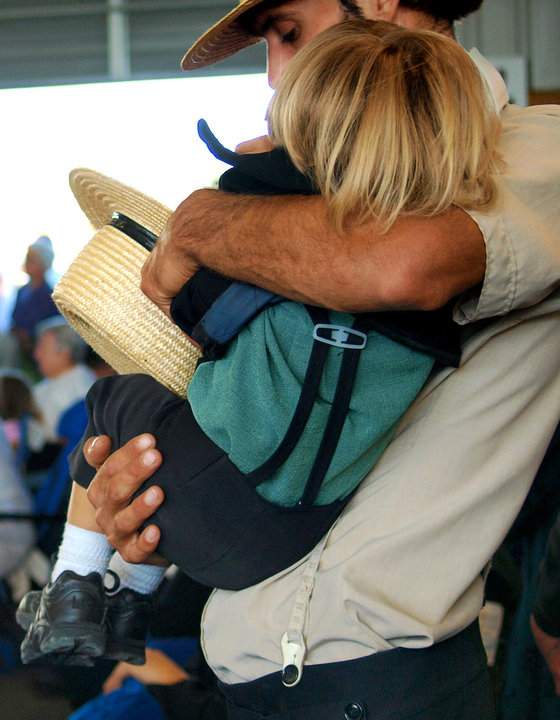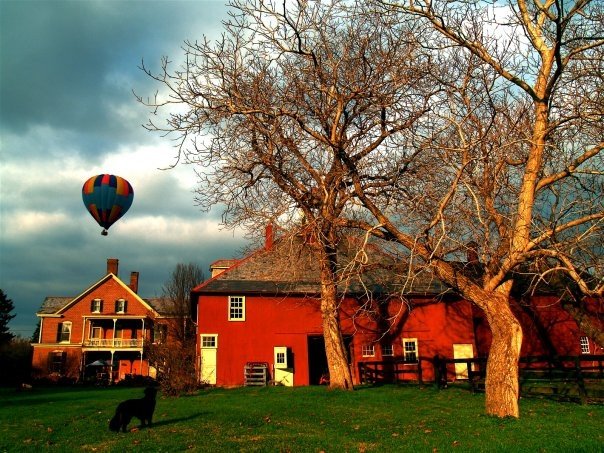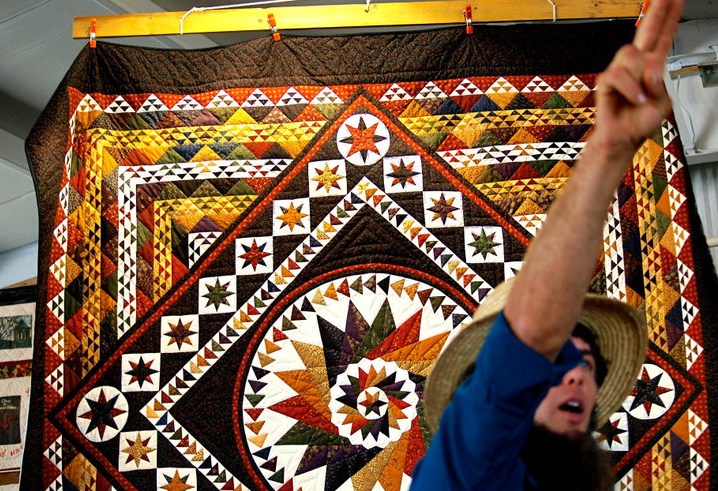 I drove up to an auction in the Pennsylvania hayfields, parked in the field to the left because the lot to the right was reserved for buggies and horses. Maybe five auctions were going on in different parts of the fairground and everywhere were Amish in black and dark jewel-colored clothes, Mennonites in black and light sprigged cottons, all the old Anabaptist sects, the people that locals call “plain folk.” They spoke a dialect of German you couldn’t understand even if you understand German. They had no-shit faces, meaning they don’t hand it out but if you do, then that’s the kind of person you are.
I drove up to an auction in the Pennsylvania hayfields, parked in the field to the left because the lot to the right was reserved for buggies and horses. Maybe five auctions were going on in different parts of the fairground and everywhere were Amish in black and dark jewel-colored clothes, Mennonites in black and light sprigged cottons, all the old Anabaptist sects, the people that locals call “plain folk.” They spoke a dialect of German you couldn’t understand even if you understand German. They had no-shit faces, meaning they don’t hand it out but if you do, then that’s the kind of person you are.
Kids were quietly all over the place, and a surprising number of them were in wheelchairs – plain peoples’ kids are unusually likely to have genetic diseases that interfere with the way their bodies process proteins, which in turn plays havoc with the parts of their brains that control muscles. The auctions were to raise money for the clinic that treats them, The Clinic For Special Children, which is what the plain people call these kids, God’s special children. The clinic supplies these people who have no telephones, no cars, no electric stoves, no electric lights with the only true personalized genetic medicine in the country.
The clinic was started by Holmes Morton, a West Virginia boy who dropped out of high school, talked his way into college, got interested in pediatric neurology, wound up at Harvard Medical School. He worked at a children’s hospital in Philadelphia where he analyzed a case of glutaric aciduria, a disease in which the child is normal at birth, is healthy for months, then one morning gets some common virus and by afternoon, can’t walk, and in the worst cases, can’t sit, talk, or swallow. Abrupt onset like that is the hallmark of a treatable disease, so Morton decided to go out to Pennsylvania Dutch country and meet the family. In fact, he met a lot of other families with a lot of similar problems, and because he thought glutaric aciduria might be not only treatable but preventable, he wrote a proposal to the National Institutes of Health. He got turned down. So at age 38, he decided to open his own clinic, though he doesn’t remember deciding anything except that the kids needed help. The Wall Street Journal wrote an article about him, and money and lab equipment appeared as if by magic. In November of 1989, the plain people raised the clinic in one rainy day.
 The clinic equipment eventually included a genetic sequencing machine, and Morton hired a geneticist. Now during childbirths, which are generally at home, the midwife takes a sample of amniotic fluid and has it couriered to the clinic to be tested for genetic disorders; sometimes the baby hasn’t even been born yet. Babies with genes for a disorder spend the first two years of their lives on special diets and don’t get sick. Kids with less-treatable diseases are tested in the clinic, and though they don’t recover, they don’t get worse. The tests cost a tenth what they would in a commercial lab, results are back in a half hour, and the kids are treated before they leave the office. The clinic buys its own diagnostic equipment and charges nominal fees; it buys medication wholesale and charges retail. It’s a model of health care, says Morton’s wife Caroline, the daughter of a country doctor who works in the clinic, “that’s very old.”
The clinic equipment eventually included a genetic sequencing machine, and Morton hired a geneticist. Now during childbirths, which are generally at home, the midwife takes a sample of amniotic fluid and has it couriered to the clinic to be tested for genetic disorders; sometimes the baby hasn’t even been born yet. Babies with genes for a disorder spend the first two years of their lives on special diets and don’t get sick. Kids with less-treatable diseases are tested in the clinic, and though they don’t recover, they don’t get worse. The tests cost a tenth what they would in a commercial lab, results are back in a half hour, and the kids are treated before they leave the office. The clinic buys its own diagnostic equipment and charges nominal fees; it buys medication wholesale and charges retail. It’s a model of health care, says Morton’s wife Caroline, the daughter of a country doctor who works in the clinic, “that’s very old.”
 The plain people came from a dozen couples who immigrated in the 1700’s, and though they don’t marry cousins, they also don’t marry outside the church. So a mutation on a gene in one of those dozen couples now runs through a population. Maybe 7,000 people are at the auction. The clinic’s budget is around $1 million a year, and the auction raises a third of it. Everything being auctioned – food, crafts, farm equipment, motor oil, toys, handmade furniture – has been donated outright. A quilt can have 5,000 pieces and take a year to handsew, and during this year’s auction, next year’s quilt was being started. The quilts are art. They could be sold commercially for between $1000 and $3000. And they’re given outright.
The plain people came from a dozen couples who immigrated in the 1700’s, and though they don’t marry cousins, they also don’t marry outside the church. So a mutation on a gene in one of those dozen couples now runs through a population. Maybe 7,000 people are at the auction. The clinic’s budget is around $1 million a year, and the auction raises a third of it. Everything being auctioned – food, crafts, farm equipment, motor oil, toys, handmade furniture – has been donated outright. A quilt can have 5,000 pieces and take a year to handsew, and during this year’s auction, next year’s quilt was being started. The quilts are art. They could be sold commercially for between $1000 and $3000. And they’re given outright.
Back in Baltimore, my life is full of intense people doing interesting things, but that auction was a little disconcerting. It was also full of intense people, but the things they do go way beyond interesting.
Credits: Photos all by, and used with the kind permission of, Mary Caperton Morton. Holmes Morton is her father. Much of the information was lifted wholesale from her story, here and here.
“Beyond interesting” Next book?
Beautiful post, Ann. This is the first I’ve heard of this.
Great title, Gail, but I can’t think of a book to go with it. Thank you, Heather. I pirated it from an ex-student in exchange for spending $$ at the auction and linking to her story on our page. The barter economy.
a related (and similarly compelling) story was on the cover of Hopkins Mag this summer:
http://magazine.jhu.edu/2010/06/the-disease-chaser
That’s so interesting, Ginny. He’s almost got to be related to Mary’s folks.